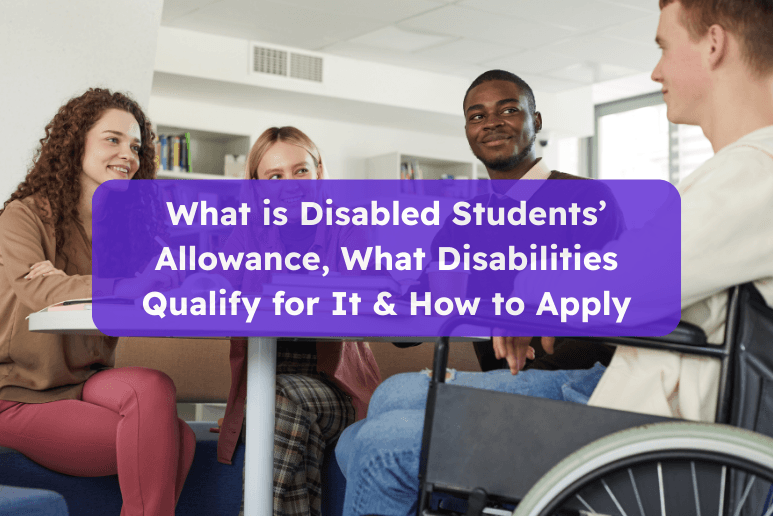All Articles
3 min read
What is Disabled Students’ Allowance, What Disabilities Qualify for It & How to Apply
Written by
Purpl
Published on
August 27, 2025

Navigating university life can be challenging, especially when managing a disability. The Disabled Students’ Allowance (DSA) is here to help. This UK government-funded support provides financial assistance to students with disabilities, long-term health conditions, mental health conditions, or specific learning difficulties, ensuring they have the necessary resources to succeed in higher education.
What is Disabled Students’ Allowance?
The Disabled Students’ Allowance (DSA) is a non-repayable grant designed to cover the extra costs students incur due to their disability. Unlike other student finance, DSA is not means-tested, meaning your household income doesn’t affect your eligibility. The allowance can help with:
- Specialist equipment (e.g., computers, software)
- Non-medical helpers (e.g., note-takers, sign language interpreters)
- Travel costs related to your course
- Additional course-related costs
It’s important to note that DSA doesn’t cover general living costs or expenses unrelated to your studies.
Who is Eligible to Receive the Disabled Students’ Allowance?
To qualify for DSA, you must:
- Be a UK resident
- Have a disability, long-term health condition, mental health condition, or specific learning difficulty
- Be enrolled in a higher education course lasting at least one year
- Be eligible for student finance
DSA is available to full-time, part-time, and postgraduate students, including those studying with the Open University or via distance learning. However, students on apprenticeships are not eligible for DSA.
What Disabilities Qualify for DSA?
DSA supports students with various conditions, including:
- Specific learning difficulties (e.g., dyslexia, dyspraxia)
- Mental health conditions (e.g., depression, anxiety)
- Physical disabilities (e.g., mobility impairments)
- Sensory impairments (e.g., visual or hearing impairments)
- Long-term health conditions (e.g., chronic fatigue syndrome, epilepsy)
If you’re unsure whether your condition qualifies, it’s advisable to contact your student finance provider for guidance.
How Much Funding is Provided by the Disabled Students’ Allowance?
The amount of DSA funding varies based on individual needs, as determined through a study needs assessment. The funding is divided into four main categories:
- Specialist Equipment Allowance: Covers the cost of equipment such as computers or software tailored to your needs.
- Non-Medical Helper Allowance: Pays for support services like note-takers or sign language interpreters.
- General Allowance: Assists with other course-related costs, such as travel or printing.
- Travel Allowance: Reimburses additional travel expenses incurred due to your disability.
The exact amount you receive will depend on your specific requirements and the recommendations made during your study needs assessment.
How to Apply for Disabled Students’ Allowance
Applying for DSA involves several steps:
- Complete the DSA Application Form: Start by filling out the DSA1 form, available from your student finance provider.
- Provide Evidence of Your Disability: Submit medical evidence or a diagnostic assessment confirming your condition.
- Attend a Study Needs Assessment: After your application is processed, you’ll be invited to a study needs assessment to determine the support you require.
- Receive Your DSA Entitlement Letter: If approved, you’ll receive a letter outlining the support and funding you’re entitled to.
It’s recommended to apply as early as possible, ideally before your course starts, to ensure timely provision of support.
Is It Necessary to Reapply for DSA Each Academic Year?
Yes, if you’re studying part-time or through the Open University, you’ll need to apply for DSA each academic year. However, if you’re a full-time student, you typically don’t need to reapply unless your circumstances change. It’s essential to keep your student finance provider informed of any changes to your condition or study status.
What Are the Criteria for Ineligibility for DSA?
You may not be eligible for DSA if:
- You’re not a UK resident
- You’re not enrolled in a qualifying higher education course
- You’re receiving equivalent support from another funding source (e.g., NHS bursary)
- You’re on an apprenticeship scheme
It’s crucial to check the specific eligibility criteria with your student finance provider to ensure you meet all requirements.
Additional Support and Resources
Beyond DSA, universities often offer additional support services, such as:
- Disability support teams
- Accessible study materials
- Exam accommodations
- Peer mentoring programs
Contact your university’s disability support office to learn more about the services available to you.
For further information and guidance on DSA, visit the official GOV.UK page on Disabled Students’ Allowance.
Follow @Purpldiscounts on social media for the latest disability discounts, financial advice, and accessibility resources.
Other articles, or links, you might find useful:
Discounts on Computers & Laptops for Purpl members
How to Get Help as a Disabled Student – DSA
